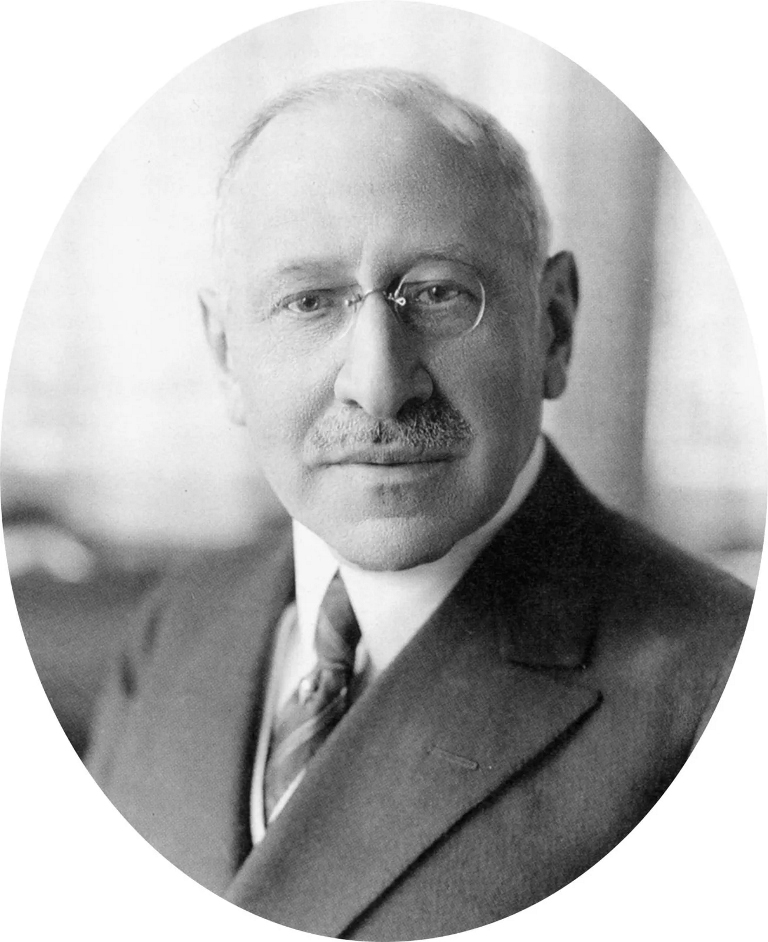Who Was Julius Rosenwald?

1862-1932
Julius Rosenwald was an American businessman and philanthropist. He is best known as a part-owner and President of Sears, Roebuck and Company and for establishing the Rosenwald Fund, which donated millions in matching funds to promote vocational or technical education.
Rosenwald was the son of German Jews who fled centuries-long persecution in Europe and settled in Springfield, IL*. Born there in 1862, Rosenwald took seriously the Jewish concept of tzedakah – the injunction to treat every person with a sense of righteousness and fairness. He used the great wealth he amassed after transforming Sears, Roebuck into a retailing powerhouse to assist many groups and institutions and, in particular expanded the opportunities available to African Americans.
In early 1911 Rosenwald offered to contribute $25,000 toward the construction of YMCAs for African Americans in all cities in which the communities would first provide a $75,000 matching share. These facilities were needed because of the Jim Crow segregation policies in northern and southern states. As a result of these challenge grants, African American YMCAs were built in 24 cities.
Through this connection with the YMCA, Rosenwald met and became friendly with Booker T. Washington whose memoir, Up From Slavery, had inspired him. At Washington’s invitation Rosenwald joined the Board of Trustees of the Tuskegee Institute and agreed to a pilot project providing funds that, added to the funds already raised, enabled six rural communities in Alabama to build schoolhouses. This project was the beginning of the program that, in coordination with local governments and communities, led to the construction of 5,357 schools and related buildings in 15 southern states.
In 1917 Rosenwald created the Julius Rosenwald Fund, which made substantial contributions to improving African American life in addition to the schools that bear his name. The Fund supported early NAACP legal cases that eventually led to the Brown vs. Board of Education of Topeka case before the Supreme Court. Starting in 1928, the Rosenwald Fund granted fellowships to talented African Americans in the Arts and Sciences. A number of Fellows, including historian John Hope Franklin and psychologists Kenneth and Mamie Clark, assisted Thurgood Marshall in preparing the second brief for the Brown vs. Board case that led to the decision outlawing “separate but equal” education.
Other notable Rosenwald Fellows include sociologist, historian and activist W.E.B. Du Bois, author and activist Pauli Murray, artist Jacob Lawrence, poet Langston Hughes, contralto Marian Anderson and Dr. Charles Drew. Each contributed in significant ways to the civil rights movement and to the larger American story.
Rosenwald donated to numerous other worthy causes, playing a pivotal role in the creation of the Jewish United Fund of Metropolitan Chicago and contributing to other Jewish and Chicago-based charities. He was the driving force for and the main benefactor of Chicago’s Museum of Science and Industry.
The two pillars of Rosenwald’s approach to philanthropy were the “challenge of matching grant” and the “give while you live” philosophy. Both approaches are widely used today. Rosenwald also stipulated that the Rosenwald Fund terminate within 25 years of his death.
* Rosenwald was raised a few blocks from the home of Abraham Lincoln in a solidly middle class household. A hard worker with a genius for retailing, by the time he became President of Sears, Roebuck, at the age of 33, he was already a millionaire. His meteoric rise in business mirrored the role that philanthropy played in his life. Early in his adult life he decided that he would give as much as 1/3 of his income to charity, even when the amounts involved were fairly small. By the time of his death in 1932, he had more than lived up to his pledge, having contributed more than $60 million ($770 million in 2007) to various philanthropic causes.”
Julius Rosenwald: The Man Who Built Sears, Roebuck and Advanced the Cause of Black Education in the American South,” Peter Max Ascoli, Indiana University Press
Julius Rosenwald & Rosenwald Schools National Historical Park Campaign
